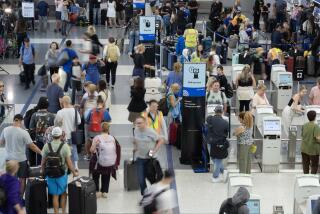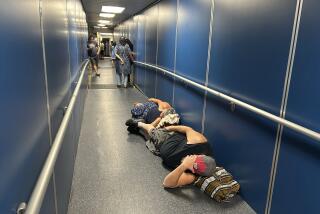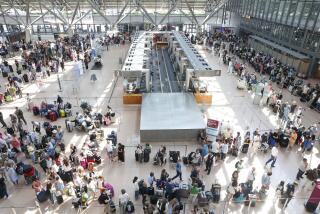Passengers, Airline Thrown Together in a Stormy Relationship
- Share via
So many hours did they languish on the tarmac, sealed inside aircraft after aircraft, captives of snow and snafu, that on Eric Felgemacher’s plane, his claustrophobic wife burst into tears. He half wondered if the engines would die, the heat would dissipate and a load of humanity would freeze. He picked up an air phone to alert the media, to get a court order maybe, only to encounter a dysfunctional phone system.
So many hours evaporated while Steven Hamlen sat on a plane that a frazzled 6-year-old boy traveling alone took to launching Matchbox cars at seat mates. “He hit me,” Hamlen said. “He hit people around me. He had pens, Magic Markers, and he was throwing those too.”
So many hours passed that on Sharon Friedman’s plane, she heard a crew member scream into a radio, “You have to get us a gate and get us off the plane!” A passenger, having perused the airline’s magazine and spotted the CEO’s name, used a cell phone to get his home number in Minnesota, gave it to the pilot and demanded that he call him. He did.
“We’ve been on this plane over seven hours,” Friedman heard him tell his boss, “and we’ve got a desperate situation.”
What happened on the year’s first weekend at the Detroit airport has become not only the stuff of a federal inquiry and a class-action lawsuit but also instant lore within the world of domestic aviation.
Several thousand travelers, many returning from warm locales and holiday adventures, were marooned for as long as nine hours aboard at least 30 airships that could neither fly away to freedom nor snuggle up to gates because of ugly conditions generated by a foot of fresh snow. Delays are a chapter in every voyager’s book of experiences, but rarely does any equal sitting through “Gone With the Wind.”
Twice.
The Great Wait of the weekend of Jan. 2-3 illuminated the pressures and fragility of the major airlines’ hub-and-spoke systems and gave passengers accustomed to living in a mobile society a dose of a little-appreciated reality: Once your flight leaves the gate, your life is not your own. The airline rules. It is as if the traveler enlists in the Air Force, subject to the commands of the pilots and their superiors, until discharged at the next stop.
For obvious reasons of safety and efficiency, no regulation gives passengers a right to be released upon demand, federal officials say. None limits how long they may be kept in deteriorating conditions, nor stipulates that they must be provided food and beverages, nor sets standards for bathroom hygiene.
Such rules of creature comforts might not exist because there has never been a need. For one thing, no one can recall a debacle as big as the one in Detroit. Although countless travelers have been stranded inside terminals because of bad weather, equipment failure or congestion, they could still walk around, eat, watch TV and use clean bathrooms.
“It takes this kind of extreme case to break the rule that you don’t have any rights,” says Lawrence S. Charfoos, an attorney for five of the Detroit passengers with a lawsuit that alleges emotional distress and false imprisonment, a suit that at least 170 other passengers have contacted Charfoos about.
But Aaron Gellman, director of the Transportation Center at Northwestern University, opposes federal intervention to establish passenger rights. The unseen hand of capitalism is enough, Gellman said. Airlines do not want to be known for operating tarmac gulags.
“They don’t want to keep you there,” Gellman says. “It’s in their interest to get you off so they can use the plane again. That’s enough of an incentive.”
If the Detroit incident reflected callousness or mismanagement, Gellman says, “then they’ll pay the price in the marketplace, and they know that.”
More than one airline suffered at Detroit, but the lawsuit is aimed at Northwest Airlines, Detroit’s biggest carrier. Struggling to maintain the in-and-out dance of its biggest hub, Northwest pushed departing planes away from gates--only to find they couldn’t get off the ground and had no gates to return to. It kept landing planes from across the country--only to find there weren’t enough gates for them either.
“You make judgments, and sometimes they’re wrong,” said Jon Austin, a spokesman for Northwest, noting that the storm was monstrous. The airline sees no merit to the suit, but it has apologized by mailing 4,500 passengers coupons good for a free round-trip ticket anywhere in the 48 contiguous states.
As the hours crawled by, no one died or became seriously ill; no fights broke out; no mutinies occurred. But cabin after cabin experienced meltdown. Captives cursed, phoned for help, concocted rescue schemes and wondered why other airlines’ planes were taking off but not theirs.
Food, formula, beverages and reading material dwindled on planes that had been making relatively short domestic hops. The aroma of fuel competed with that of overtaxed toilets. Passengers fumed about why buses and portable stairs weren’t driven out to them and why planes blocking gates couldn’t be pushed out of the way.
“As the afternoon wore on and the sun started going down, people were getting upset,” said Felgemacher, 39, a software writer from Kalamazoo, Mich., who landed after a Florida vacation only to sit for more than seven hours. “I took a nap, and then I ran out of things to read. We were trying to make light conversation. . . . About two hours before we were let off the aircraft, we were told the holding tanks were full and we couldn’t use the bathrooms anywhere.”
Most passengers had nothing but praise for flight crews, who were calm, sympathetic and just as unhappy. Passengers had nothing but derision for Northwest. “There had to be some pretty incompetent people someplace to allow that aircraft to depart Tampa knowing full well that they had no place to park it when it arrived,” Felgemacher says.
Northwest, in reply, says its business is getting people where they hope to go, and so it made the decision to try. Things didn’t work out. Massively disrupting lives is not its priority: “If it’s not the last thing we [want to] do, it’s well down the list,” spokesman Austin says.
More to Read
Sign up for The Wild
We’ll help you find the best places to hike, bike and run, as well as the perfect silent spots for meditation and yoga.
You may occasionally receive promotional content from the Los Angeles Times.






